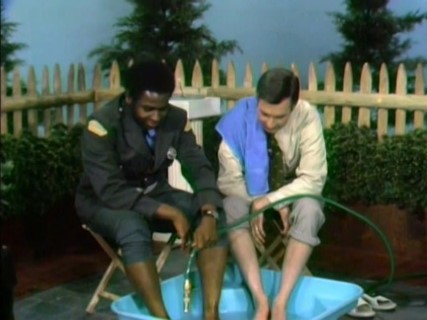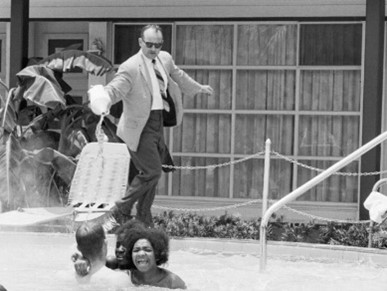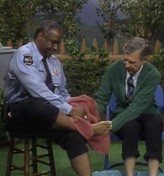SOMETIMES JUST A MINUTE LIKE THIS

WILL REALLY MAKE A DIFFERENCE
4th Week of Lent 2024

Did you watch “Mr. Rogers’ Neighborhood” when you were little (or have kids who did)? I was a “Captain Kangaroo” girl myself, so I only just recently learned about Officer Clemmons, the friendly policeman who was one of Mr. Rogers’ neighbors. Francois Clemmons joined the cast of Mr. Rogers’ Neighborhood in August 1968, becoming the first Black person to have a recurring role on a children’s TV show in the United States. Fred Rogers had heard Francois, a professional opera singer, singing at the Presbyterian Church in Pittsburgh they both attended, and asked him to join the show.
Not long after Clemmons joined the cast of Mr. Rogers’ Neighborhood, Fred Rogers wrote a script for an episode in June 1969 that told the story of a hot summer day and a wading pool in Mr. Rogers’ front yard. Officer Clemmons comes walking by and Mr. Rogers invites him to take a break and join him in resting his feet in the cool water of the pool. Officer Clemmons accepts, and before long he has his shoes and socks off and is seated next to Mr. Rogers, splashing his feet as they add more water from the garden hose. After a few minutes, Officer Clemmons says he has to get back to work, so Mr. Rogers offers him a towel and helps him dry his feet off before he puts his socks and shoes back on. “Sometimes just a minute like this will really make a difference,” Mr. Rogers says, happily splashing his toes in the pool as Officer Clemmons stands up to leave.

Sometimes just a minute like this will really make a difference. Fred Rogers, who was an ordained Presbyterian minister by the way (and for those of you keeping score at home, that’s one point for my team!), knew exactly how much of a difference a minute like that one in the wading pool could make.
For starters, Mr. Rogers knew about the biblical symbolism of foot washing, a ritual many churches incorporate into their services at the end of Lent. The gospel of John tells the story of Jesus, on the night before his crucifixion, kneeling down and washing the feet of his disciples, saying that he was giving them an example to follow. The roles of master and servant were reversed, and an act of humble service now defined how Jesus’ followers were to show their love for one another. Sometimes just a minute like this will really make a difference.
But the scene in Mr. Rogers’ wading pool was powerful for another reason, too. It was 1969. Just the year before, Martin Luther King had been assassinated, and the segregated South was still putting up a fierce resistance to the civil rights movement. The scene from Mr. Rogers’ Neighborhood where Officer Clemmons and Mr. Rogers dipped their feet into that wading pool actually aired on the fifth anniversary of “wade-ins” held by civil rights protestors in Florida in 1964. Like the sit-ins at whites-only lunch counters, wade-ins were acts of civil disobedience by Black activists who broke the law by wading into public pools and beaches designated for whites only.

On June 18, 1964, a wade-in was held at the whites-only swimming pool of the Monson Motor Lodge in St. Augustine, Florida. The hotel manager actually dumped a jug of acid into the pool to frighten the protestors and get them out. When President Johnson heard this news, he was outraged and said, “Our whole foreign policy and everything else could go to hell over this. Yesterday in the swimming pool in St. Augustine they started pouring acid in the pool!” The next day the Civil Rights Act was passed in Congress, after an 83-day filibuster in the Senate. Sometimes just a minute like this will really make a difference.
So on the five-year anniversary of those events, Fred Rogers and Francois Clemmons sat side by side next to a wading pool with their pant legs rolled up, and their shoes and socks off. In an interview about that day, Francois said, “The icon Fred Rogers, not only was showing my brown skin in the tub with his white skin as two friends, but as I was getting out of that tub he was helping me dry my feet. That scene touched me in a way that I was not prepared. I think he was making a very strong statement. That was his way.”
As Fred Rogers said, “Sometimes just a minute like this will really make a difference.”
Francois Clemmons tells of another such minute with Fred Rogers that really made a difference: “I’ll never forget one day I was watching him film a session. And you know how at the end of the program he takes his sneakers off, hangs up his sweater and says, ‘You make every day a special day just by being you, and I like you just the way you are’? I was looking at him when he was saying that, and he walks over to where I was standing. And I said, ‘Fred were you talking to me?’ And he said, ‘Yes, I have been talking to you for years. But you heard me today.’ It was like telling me I’m OK as a human being. That was one of the most meaningful experiences I’d ever had.” Sometimes just a minute like this will really make a difference.
Telling Francois he was loved and accepted as a human being was such a meaningful thing for Fred to do not only because Francois was Black, but because Francois was gay, and had come out to Fred—a huge risk to take in the 1960’s. Fred kept him on the show, and he and his wife counted Francois as one of their closest personal friends for the rest of their lives. While it’s true that in the early years Fred counseled Francois to stay in the closet and even to marry a woman because he thought if word got out it could harm his music career, Fred evolved in his thinking and changed his advice, encouraging Francois to enter a long-term relationship with the man he loved. Fred and his wife, Joanne, welcomed Francois’ friends from the gay community into their home and onto the television set in Pittsburgh, and they worshiped at a Presbyterian Church known for being open to and affirming of LGBTQ people. Fred really did practice what he preached: when he told us he liked us “just the way you are,” he meant it.

In 1993, during his final appearance on Mr. Rogers’ Neighborhood, Officer Clemmons returned to that front yard where he and Mr. Rogers had rested their feet in the wading pool 24 years earlier. And the two old friends had a chance to re-enact their revolutionary wade-in and foot washing. As they sat together with their feet in the pool, Officer Clemmons sang the song, “Many Ways to Say I Love You,” written by Fred Rogers.
This Lent, I invite you to incorporate into your Lenten discipline the challenge this song presents: to imagine the many ways you can say I love you—to your friends and family, to God, to people in need or in crisis, to your enemies, to yourself—and to put it into practice. You may be surprised what a profound difference it can make. As Mr. Rogers said: “Sometimes just a minute like this will really make a difference.”
In the spirit of the one whom we follow, who though a Master, became a humble servant washing the feet of his friends. In the spirit of our gracious God, whose unconditional love is expressed in those beloved words Mr. Rogers spoke at the end of every hour we spent with him: “I like you just the way you are.” Go out into the world this Lent and really make a difference as you discover that there truly are many ways, many ways, many ways to say I love you.

Rev. Jane Field, MCC Executive Director

